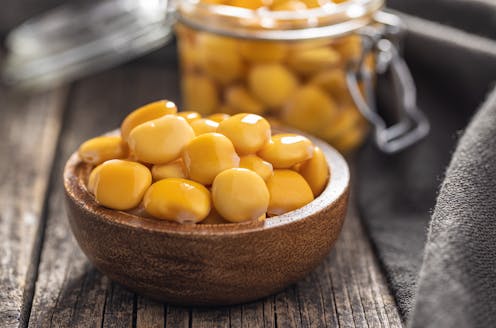Is this the protein plant of the future? New study finds 'sweetness gene' that makes lupins tastier
- Written by Matthew Nelson, Plant Geneticist, CSIRO

If you walk into a bar in Italy, you might be served a dish of salty, nutritious snacks: lupin beans, a legume that has been eaten around the Mediterranean and in parts of the Middle East and Africa for thousands of years.
Lupins are very high in protein and fibre, low in carbs, have a low glycaemic index, and they’re easy to grow in a variety of climates. However, some varieties also contain high levels of unpleasantly bitter alkaloids.
In new research[1], an international team of researchers has for the first time identified the “sweetness gene” responsible for low alkaloid levels. This discovery may make it easier to reliably produce more palatable plants.
The search for sweetness
Around 100 years ago, plant breeders in Germany found natural mutations that produced “sweet lupins” with far lower levels of bitter alkaloids. They produced sweet varieties of white lupin (Lupinus albus), narrow-leafed lupin (Lupinus angustifolius, the main type grown in Australia), and the less common yellow lupin (Lupinus luteus).
Over the past 50 years or so, lupins have become more common as food for farm animals. Sweet lupins are good for this, as they don’t require extensive washing to be usable. They are also increasingly eaten by humans – and we are very sensitive to bitterness.
To find the genetic basis for “sweet” lupins, we used a few approaches.
A genetic search
Our colleagues in Denmark studied the biochemistry of the different alkaloids in both bitter and sweet varieties. By looking at the changes in the composition of the alkaloids, we could get an idea of the genes involved.
My own work was on the genetics end. We analysed 227 varieties of white lupin and tested their alkaloid levels.
Then, with colleagues in France, we looked at markers across the lupin genome and tried to associate high and low alkaloid levels with the genetics.
We had clues about where we thought the gene would be, in a certain region of a few dozen genes. There was one we thought looked the most promising, so we designed a lot of DNA markers to work out what sequence varied in that gene.
Eventually we found a very strong link between a change in alkaloid levels and a variation of a single sequence in our gene.
Read more: Pulses are packed with goodness: Five cool things you should know about them[3]
The final test was to find out whether a variation in this gene would also produce sweetness in other types of lupin. In some other plants we would be able to use genetic modification tools to do this, but for various reasons this is difficult in lupins.
Instead, we went to a company called Traitomic who screened a huge number of seeds of narrow-leafed lupin until they found one which naturally had exactly the mutation we were looking for. And when we tested that plant, it had low alkaloids – confirming we really had found the “sweetness gene”.
A reliable marker
In practice, growing sweet white lupin can be a bit tricky. There are several different strains that have different low alkaloid genes, and if these strains cross-pollinate, the result can be bitter lupin plants once again.
The research gives a reliable genetic marker for plant breeders to know what strains they are dealing with. This means it will be much easier to consistently grow sweet white lupin.
At the moment most of what is grown in Australia is narrow-leafed lupin, in part because the industry had a hard time keeping the white lupin sweet (and in part because white lupin was plagued by a fungal disease called lupin anthracnose). So perhaps in future we’ll see white lupin make a comeback.
Our vision is more cultivation of the high-protein, hardy lupins for consumption by humans.
Read more: Plant-based patties, lab-grown meat and insects: how the protein industry is innovating to meet demand[4]
References
- ^ new research (www.science.org)
- ^ Shutterstock (www.shutterstock.com)
- ^ Pulses are packed with goodness: Five cool things you should know about them (theconversation.com)
- ^ Plant-based patties, lab-grown meat and insects: how the protein industry is innovating to meet demand (theconversation.com)

















